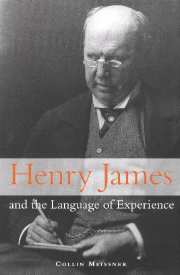Book contents
- Frontmatter
- Contents
- Acknowledgments
- Chapter 1 The experience of Jamesian hermeneutics
- Chapter 2 The experience of divestiture: toward an understanding of the self in ‘The American’
- Chapter 3 Bondage and boundaries: Isabel Archer's failed experience
- Chapter 4 Lambert Strether and the negativity of experience
- Chapter 5 Recovery and revelation: the experience of self-exposure in James's autobiography
- Notes
- Bibliography
- Index
Chapter 2 - The experience of divestiture: toward an understanding of the self in ‘The American’
Published online by Cambridge University Press: 22 September 2009
- Frontmatter
- Contents
- Acknowledgments
- Chapter 1 The experience of Jamesian hermeneutics
- Chapter 2 The experience of divestiture: toward an understanding of the self in ‘The American’
- Chapter 3 Bondage and boundaries: Isabel Archer's failed experience
- Chapter 4 Lambert Strether and the negativity of experience
- Chapter 5 Recovery and revelation: the experience of self-exposure in James's autobiography
- Notes
- Bibliography
- Index
Summary
[F]or Napoleon Egypt was a project that acquired a reality in his mind, and later in his preparations for its conquest, through experiences that belonged to the realm of ideas and myths culled from texts, not empirical reality.
Edward Said, OrientalismIn The American, Henry James's Christopher Newman is characterized as a Bädeker-toting “great Western Barbarian stepping forth in his might, gazing a while at this poor effete Old World” (32). Self-made, self-schooled, and self-mannered, Newman confesses to neither cultivation, education, nor any knowledge about “history, or art, or foreign tongues, or any learned matters” (32). Instead, he quantifies all of Europe as if it were an entity his opening question “Combien?” can answer (4). Not surprisingly, Newman learns at the close of his European experience how inadequate his mercantile American discourse is in negotiating the European text he had heretofore understood by guidebook alone. Though markedly changed at the close of his experience, Newman is unable to find the language with which to articulate what he has experienced, either for his own conceptual satisfaction or for the enlightenment of curious others. As the narrator explains, Newman “told his friends that he had brought home no ‘new ideas’ from Europe” (360). And that is just James's point in The American, a novel in which Newman's (in)ability to understand his experiences introduces the basic structure of Jamesian hermeneutics.
- Type
- Chapter
- Information
- Henry James and the Language of Experience , pp. 36 - 79Publisher: Cambridge University PressPrint publication year: 1999



